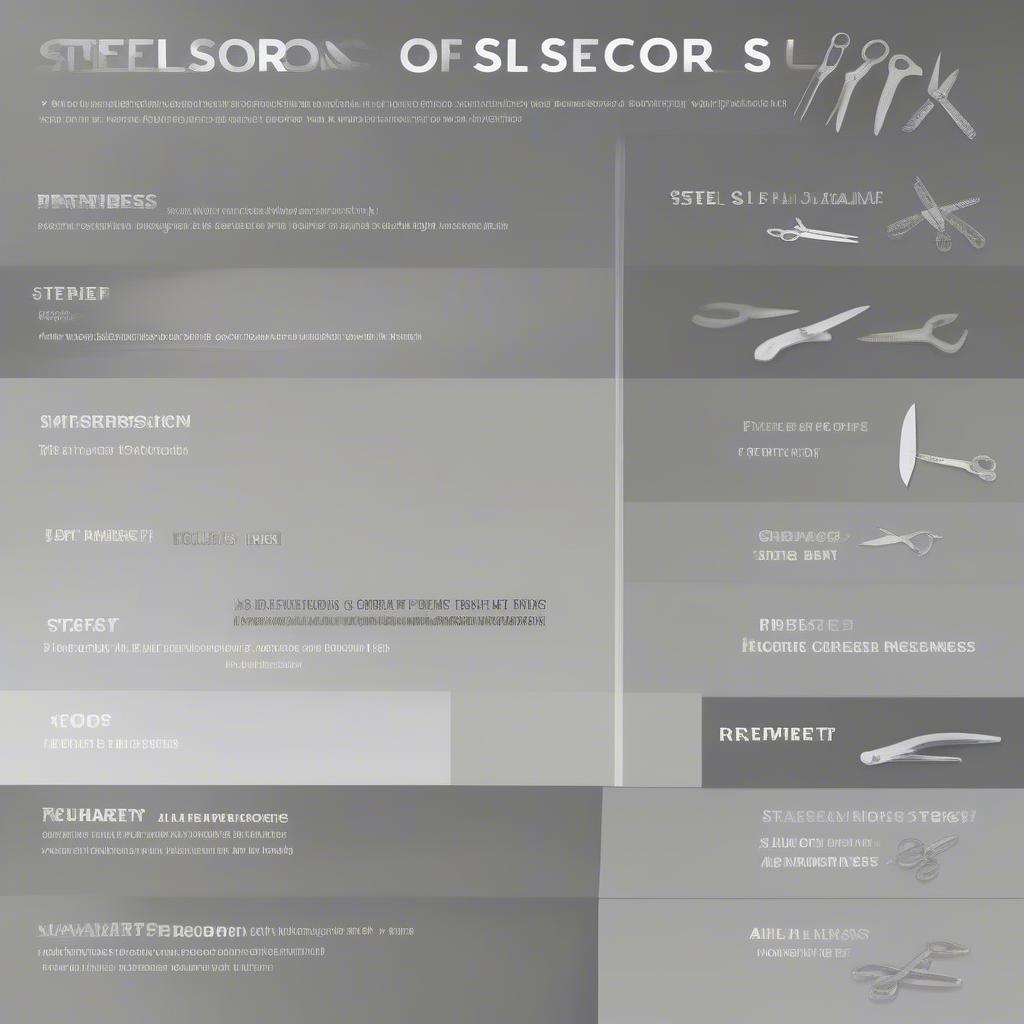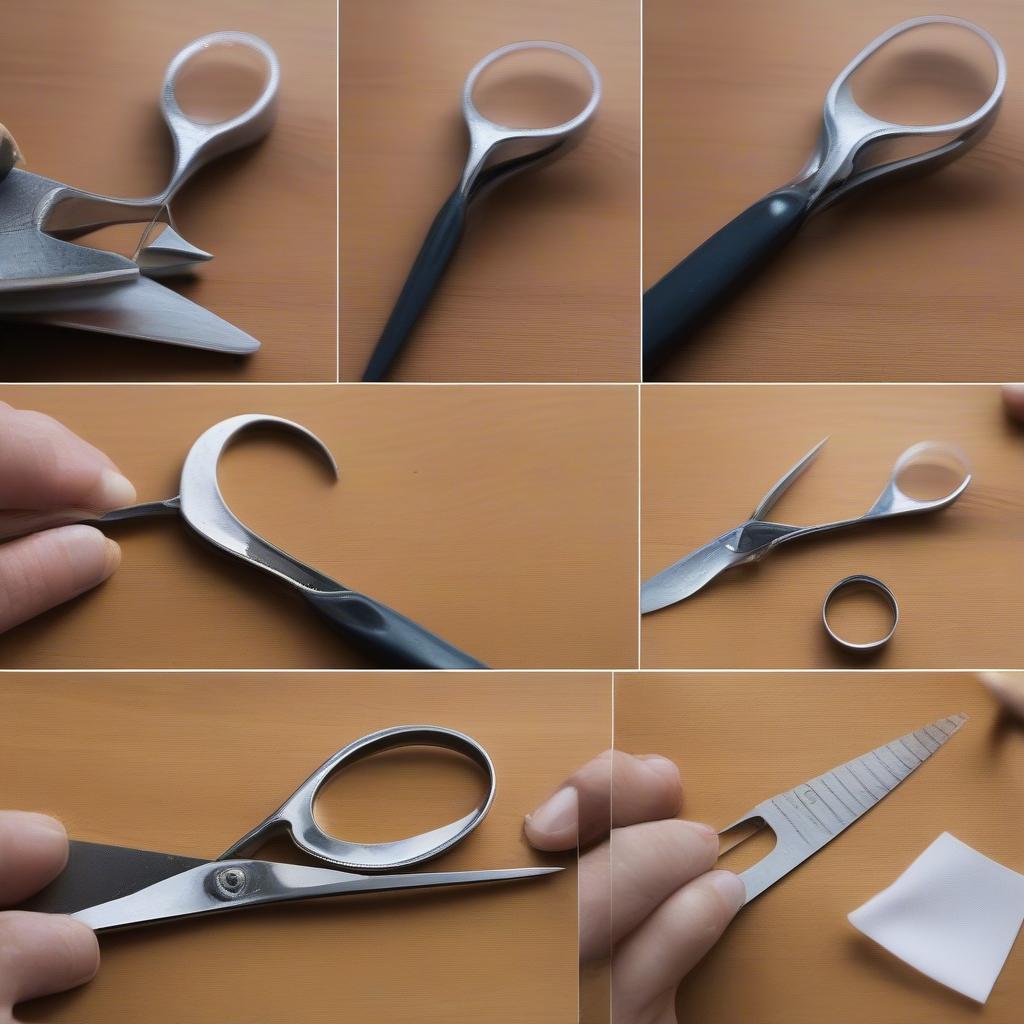Scissors Steel is a crucial component of any pair of scissors, dictating its durability, sharpness, and overall performance. Whether you’re a seasoned craftsperson working with wicker and rattan or simply looking for a reliable pair of house scissors, understanding the nuances of scissors steel is essential.
Choosing the right scissors for your wicker and rattan projects can significantly impact the quality of your work. From precise snips to clean cuts, the type of steel used in your scissors plays a pivotal role. Different types of steel offer varying levels of hardness, resistance to corrosion, and ability to maintain a sharp edge. This guide delves into the fascinating world of scissors steel, equipping you with the knowledge to make informed decisions for your crafting needs.
Understanding the Importance of Scissors Steel
The quality of your stainless steel scissors directly impacts the longevity and precision of your cuts. High-quality steel ensures the blades stay sharp for longer, reducing the need for frequent sharpening. This is especially important when working with tough materials like wicker and rattan, which can dull inferior blades quickly. Durability is another key factor. Stronger steel can withstand the rigors of regular use, preventing bending or breaking.
What Makes Good Scissors Steel?
Several factors contribute to the quality of scissors steel. Hardness, measured on the Rockwell scale, determines the steel’s resistance to deformation. Higher hardness generally translates to better edge retention. However, excessively hard steel can be brittle and prone to chipping. Corrosion resistance is crucial, especially for stainless kitchen scissors frequently exposed to moisture. Stainless steel is a popular choice for its resistance to rust. The steel’s ability to hold an edge is also critical. High-quality steel retains its sharpness for extended periods, minimizing the need for frequent sharpening.
Different Types of Scissors Steel
Various types of steel are used in scissor manufacturing, each with its own unique characteristics. Stainless steel, known for its corrosion resistance, is a common choice for household and kitchen scissors. Carbon steel offers exceptional hardness and sharpness but is more susceptible to rust. Alloyed steels combine the properties of different metals to achieve specific characteristics, such as increased hardness or improved corrosion resistance.
Choosing the Right Steel for Your Needs
Selecting the appropriate steel depends on your specific requirements. For crafting with wicker and rattan, scissors stainless are often preferred for their durability and resistance to moisture. If precision cutting is paramount, high-carbon steel scissors offer superior sharpness.
 Comparing Scissors Steel Types
Comparing Scissors Steel Types
“When working with natural fibers like wicker and rattan, stainless steel scissors are your best friend. They offer the perfect balance of sharpness, durability, and resistance to the elements,” says renowned wicker artisan, Amelia Reed.
Maintaining Your Scissors Steel
Proper care is essential for prolonging the life of your scissors. Regular cleaning and oiling prevent rust and ensure smooth operation. Sharpening should be done periodically to maintain a keen edge. Storing your scissors in a protective case prevents damage and keeps them in optimal condition.
 Maintaining Scissors Steel
Maintaining Scissors Steel
Tips for Keeping Your Scissors Sharp
Avoid cutting materials that can dull the blades, such as paper or cardboard. Use a dedicated scissor sharpener designed for the specific type of steel. Store your scissors properly to prevent damage to the blades.
“A well-maintained pair of scissors is an extension of your hand. Treat them with respect, and they will reward you with years of faithful service,” advises master craftsman, James Weaver.
Conclusion
Scissors steel is the backbone of any quality pair of scissors. Understanding the different types of steel and their properties empowers you to choose the right tool for your needs. Whether you’re a professional craftsman or a home enthusiast, investing in a good pair of stainless steel scissors is a worthwhile investment. By following proper maintenance practices, you can ensure your scissors remain sharp, durable, and ready to tackle any cutting task. Remember, a sharp blade is a happy blade!
FAQ
- What is the best type of steel for scissors?
- How often should I sharpen my scissors?
- How can I prevent my scissors from rusting?
- What are the different types of scissor sharpeners?
- How do I choose the right size scissors for my needs?
- What is a pen knife?
- Are there specific scissors for cutting wicker and rattan?
Need help with your wicker and rattan projects? Contact us at My Dinh, Hanoi, Vietnam or San Francisco, CA 94105, USA. We have a 24/7 customer service team ready to assist you.


